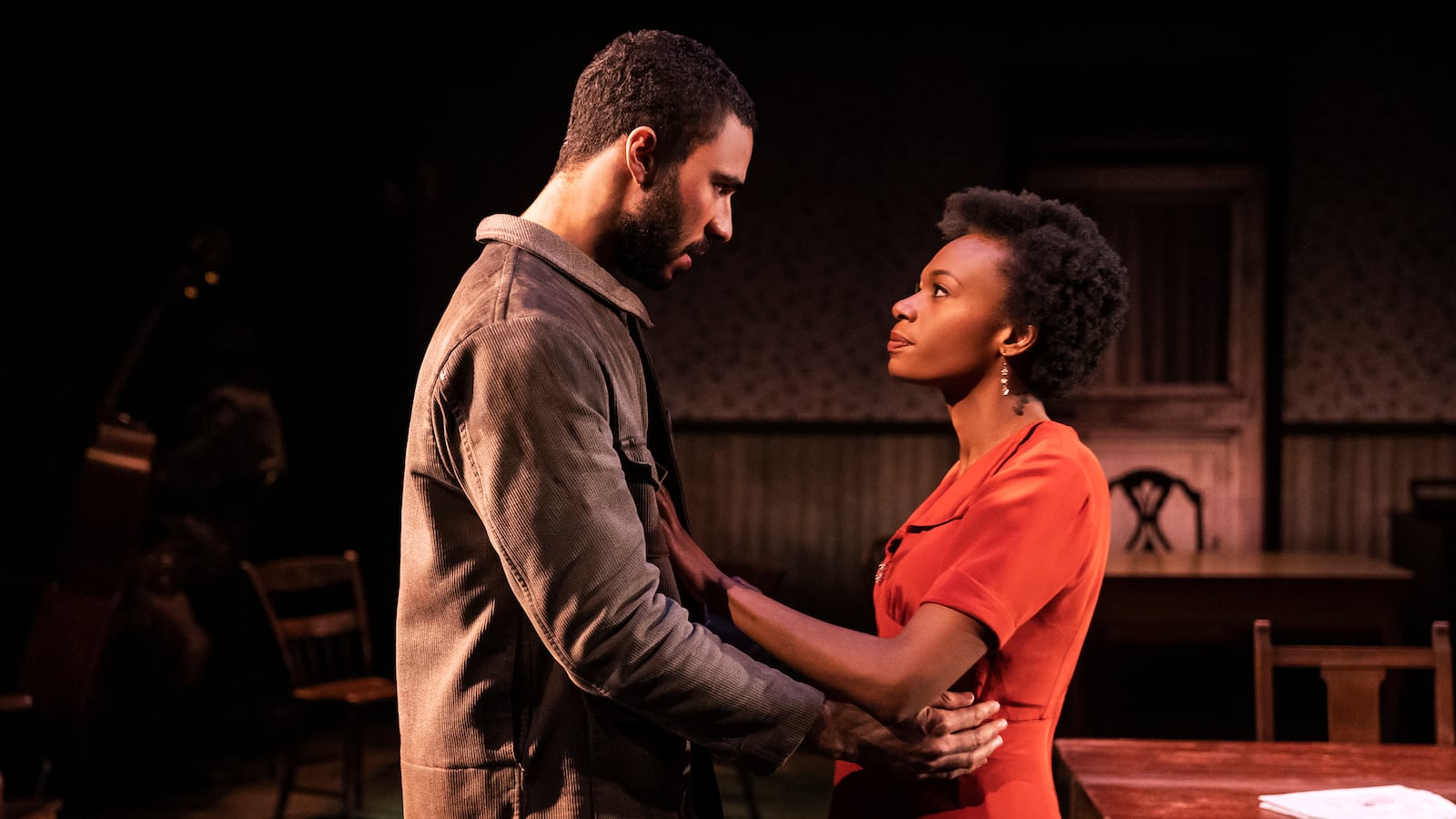The first surprise is that Girl From the North Country, which marries the resonant, deeply felt playwriting of Conor McPherson and music and lyrics of Bob Dylan, doesn’t major on Dylan’s raw folkiness. You’d think it might.
The play, opening Thursday night at Broadway’s Belasco Theatre (booking to Sept. 27) and directed beautifully by McPherson, is a gorgeous, moving, thousand-times improved transfer uptown from the Public Theater. It is set in the threadbare, Depression-era year of 1934 in a boarding house in Duluth, Minnesota, full of characters variously luckless, desperate, loving, scamming, and scrabbling.
The marriage of McPherson’s serrated storytelling—where human tragedy and absurdity scythe away alongside each other, producing as many grimaces as laughs—and Dylan’s sharp songwriting is a darkly perfect fit.
The 20 Dylan songs here impressively span from 1963 (“Girl From the North Country” itself) to 2012 (“Duquesne Whistle”), many rearranged with elements of soul, gospel, and big band, as well as staying true to what Dylan purists would want. The play combines both music and speech; it is not a musical or jukebox musical, or musical with words. Think of it more as a play furnished with Dylan jewels glinting off the prisms of the action.
At the Public the songs felt like weird, opportunistic add-ons. Here they feel gorgeously integral. Enjoy the likes of “Like a Rolling Stone” (1965), “Slow Train” (1979), “Sweetheart Like You” (1983), and a final, rousing “Forever Young” (1974), sung variously as perfectly honeyed and harshly raw.
Just visually, Girl From the North Country is a clever treat. There is its smooth staging and Rae Smith’s atmospheric design, Simon Hale’s gorgeous orchestrations, and the actors’ wonderful singing and playing of instruments, which they do with apparent ease as they navigate through McPherson’s dense script and complex direction.
Mark Henderson’s lighting takes us through every shade of day and night, and illuminates the characters en masse as if in a roiling painting. Music director Marco Paguia and the band sit partially concealed on the stage, and sometimes in the thick of the musical action.
Jay O. Sanders plays Nick Laine, the guesthouse owner, dutiful and stoic, and also cheating on his wife, Elizabeth (Mare Winningham), who is mentally ill. He is both genial and a quiet brute.
Winningham is the flinty, transfixing heart of the production. She is both vulnerable, lost to another world, a nervy presence floating and then frozen in the aspics of illness and grief. She also sees certain things piercingly clearly when the moments are right—such as when delivering the perfect condemnatory zinger to the fast-talking, creepy, and slippery Reverend Marlowe (Matt McGrath).
Just who is this Reverend, and who is the handsome and self-contained Joe Scott (Austin Scott), who blow into the guesthouse one stormy night? The latter is keen to help Marianne (Kimber Elayne Sprawl), the Laines’ black adopted daughter. Gene, the Laines’ son (Colton Ryan), is a mixture of feckless, racist, aggressive, and scared.
Like the play, Gene is an elusive mix of emotions. Songs of celebration and rallying community are sung, and then back we go into the murkiness of blackmail, racism, violence, mental illness, marital strife, financial hardship, and dysfunction. The characters need to be in this place, and they need to escape from it too. The parties we see also feel like wakes. Happy dances can become aggressive and menacing.
Robert Joy plays the town doctor (obviously quite busy in this town) and is also our narrator, keeping his most eagle eye on Nick, and so he should. Sanders plays him ambiguously as both anchor and agitator. Could he really leave Elizabeth for Mrs. Neilsen (a strong and tender performance by Jeannette Bayardelle)?
McPherson doesn’t craft a traditional love triangle here but something more heartbreaking and strange, especially when the story follows Nick and Elizabeth’s marriage to its ultimately dark destination, and their and their son’s lives far beyond the temporal bounds of the play.
Meanwhile, the Reverend’s malignancy comes to the fore in his treatment of the desperate Mr. Burke (Marc Kudisch), addict-in-waiting Mrs. Burke (Luba Mason), and their son Elias (Todd Almond), who is central to one of the most stunning pieces of Broadway lighting so far this season.
What has changed in Girl From the North Country in its journey from the Public to Broadway? The increased size of the stage helps this show of, quite literally, many moving parts. The characters and sets feel less subsumed in atmospheric clutter. The performance also breathes bigger, and so do its actors. It feels more generous and whole, less choppy.
At the Public, this critic felt that—as beautifully sung, staged, and played as his music is—Bob Dylan can feel a little in the way of the drama in Girl From the North Country. His songs did not add to what we saw in front of us. No longer. Everything in this exquisite Broadway transfer is in perfectly rendered unison.







